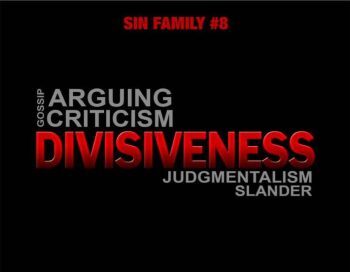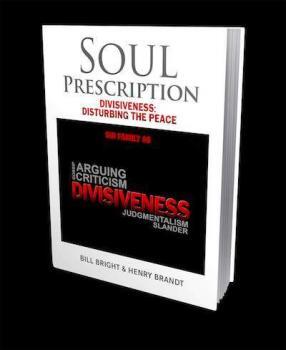Are you critical of others? Do your words sometimes harm your relationships? Do you desire to tame your tongue?
In listing the acts of the sinful nature in Galatians 5, Paul included “divisions” and “the feeling that everyone is wrong except those in your own little group” (verse 20). He was describing what goes on in a body of people when its members don’t agree. This is a type of “home divided against itself” and “kingdom at war with itself” (Matthew 12:25).
 Divisiveness can be a problem in any type of team or group. But in a church group, particularly, unity is essential to bearing fruit. It is as we are all in one accord that we move ahead, under the Spirit’s direction, to the future that God has for us. God bids us, as much as it is possible, to “live in peace with everyone” (Romans 12:18).
Divisiveness can be a problem in any type of team or group. But in a church group, particularly, unity is essential to bearing fruit. It is as we are all in one accord that we move ahead, under the Spirit’s direction, to the future that God has for us. God bids us, as much as it is possible, to “live in peace with everyone” (Romans 12:18).
When an individual is picking a fight with someone else or setting one part of a group against another, he or she is at fault before God and the body.
Are you uncertain about whether this sin habit of divisiveness describes you?
Some people seem to have a knack for contributing to a conflict so that strife grows and grows. These people need to know that in fact they are involved in a complex of sins. Certainly, sins of any sort rarely if ever stand on their own. But fighting, in particular, is a sin that tends to company with others of its kind. Sins like anger, bitterness, and envy often erupt into visibility by means of the sin of quarreling. The apostle James explored this interaction of fighting and other sins.
“What is causing the quarrels and fights among you?” James asked a contentious bunch of early Christians. And then he answered his own question. “Don’t they come from the evil desires at war within you? You want what you don’t have, so you scheme and kill to get it. You are jealous of what others have, but you can’t get it, so you fight and wage war to take it away from them. Yet you don’t have what you want because you don’t ask God for it” (James 4:1–2).
Due to the serious nature of its causes, conflict between individuals can be severe and bitter. And the closer the two people are, the more bitter the conflicts may become.
Interpersonal conflict usually occurs because of, and by means of, the words we use. “Harsh words make tempers flare” (Proverbs 15:1). With words, we quarrel, argue, and dispute. With words, we gossip, slander, and smear. With words, we mock and ridicule, taunt and deride. With words, we criticize and judge and curse and condemn.
Christians tell harmful untruths about others more often than we would like to believe. Usually they are motivated by hate, jealousy, or a thirst for revenge. We can be certain that something has gone seriously wrong in the spirit of a Christ follower who slanders another, especially if the slander is part of an ongoing pattern of behavior.
What was on Jesus’ mind when whip, thorn, and nail were just hours away? Among other things, He was concerned about our getting along. In His words to the Father, He said, “I pray that they will all be one, just as You and I are one—as You are in Me, Father, and I am in You. And may they be in us so that the world will believe You sent Me”(John 17:21).
Such unity and harmony are not ours just by choosing them; they are possible only through supernatural enabling. When Christ departed this world, He left behind the Holy Spirit to live in us and work in our hearts. He softens our hearts toward one another and quells our tendency toward conflict. For this reason, Paul could say, “Make every effort to keep yourselves united in the Spirit, binding yourselves together with peace” (Ephesians 4:3).
As we work through the soul-healing process, we should be seeking the virtue of harmony with others to take the place that was once filled by conflict. Our final word on the subject to you, then, is the same as that of the apostle Paul: “Live in harmony with each other” (Romans 12:16).
5 Steps to Overcome Divisiveness
 Discover how to overcome divisiveness in its various forms through time-tested insights that really work!
Discover how to overcome divisiveness in its various forms through time-tested insights that really work!
We have outlined a five-step process in the free e-book, DIVISIVENESS: Disturbing the Peace, to help you work through the repair of that area of your life.
[Download DIVISIVENESS: Disturbing the Peace for free now!]

